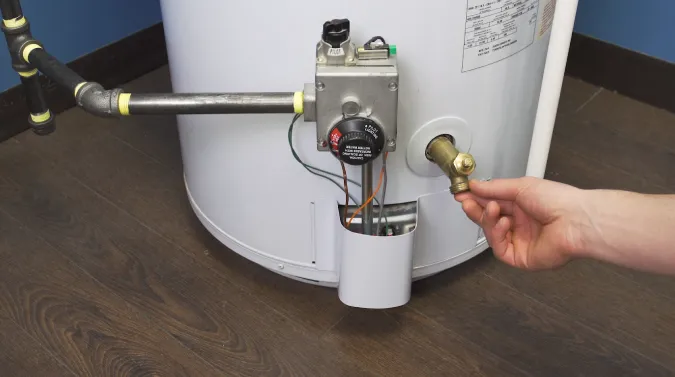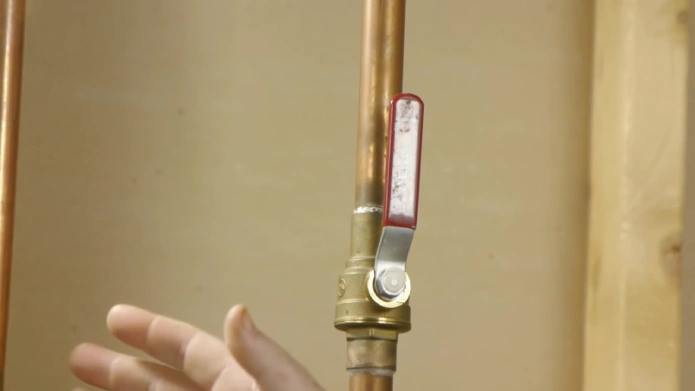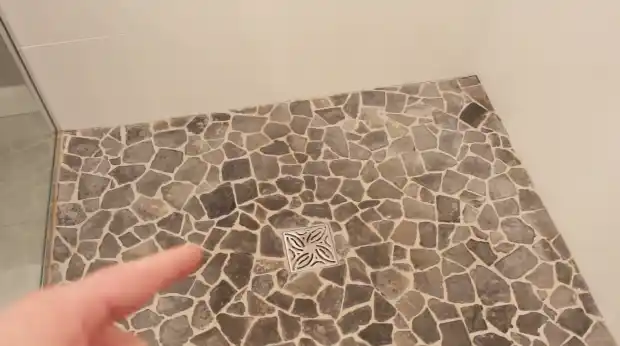Last Updated on June 18, 2023
Feeling the heat of a hot water heater leak is incredibly disheartening, yet it’s an issue that regularly arises for many homeowners. While inconvenient and costly to repair, knowing what causes this plumbing problem can help you take steps toward avoiding its destructive aftermath.
Stop those costly water-heater repairs before they even begin. Primarily inspect your system for worn plastic and failing gaskets, two of the most common contributors to hot-water leaks. But be warned, multiple other issues can lead to pesky dripping drain valves too.
From leaky drain valves to failing components, we’ll arm you with the knowledge needed to keep your home safe from costly damage.
Why Is Hot Water Heater Leaking From Drain Valve: Life Saving Reasons

Leaking from a hot water heater drain valve is an issue that should not be taken lightly. A leaking drain valve could potentially lead to significant damage and losses if the issue is not addressed quickly. Here are some causes of a leaking drain valve:
Reason 1: Corrosion or Rust in the Drain Valve
Corrosion and rusting of a hot water heater’s drain valve can lead to leaking. The corrosion process is accelerated by several factors, including exposure to humidity, temperature fluctuations, and contact with aggressive chemicals (such as salt).
The metal parts of the valve can begin to corrode due to their contact with these elements. This corrosion can weaken the seal between the valve and the tank, leading to small gaps that allow water to escape and pool around the heater’s base.
Reason 2: Sediment Build-up Around the Drain Valve
In addition to corrosion and rusting, sediment build-up around the drain valve can also lead to leaking. Over time, minerals such as calcium and magnesium will accumulate in the tank due to natural processes like evaporation or condensation.
These deposits will then collect in and around the valve, preventing it from properly forming a tight seal with the tank wall when closed. Due to this, small leaks can occur around the base of the hot water heater as a result.
Reason 3: Excess Pressure on the System
Hot water heaters make our lives easier, but one miscalculation can lead to disaster. The truth is these ingenious systems are designed to function under a certain pressure level. An increase in temperature or a large demand for hot water during peak times can cause the pressure to exceed that level, causing leaks at various points in your plumbing system.
Regularly checking your pressure levels and resetting them as necessary can prevent this from happening. If your model includes recommended temperature settings, do not exceed them.
Reason 4: Tank or Drain Pipe Cracks or Damage

If any part of the components is damaged (for example, if there are cracks), then it might not be able to support the seals or connections around it. This could cause leaking at the places where different components join each other (including near/around the drain valve).
It’s essential to regularly check both your hot water heater and any nearby pipes for cracks. This way, you can do the necessary maintenance before any serious damage occurs and leads to a leak from one of the valves in your system.
Reason 5: Incorrectly Installed or Sealed Drain Connections
Another common reason why hot water heaters leak from their drains is that some key connections haven’t been installed correctly (or sealed properly afterward). As an example, if too little silicone sealant is used to connect two pipes, it could lead to increased air circulation between the pipes over time.
The result may be leaks around/near each connection point, including those downstream near/around your hot water heater’s own drain valve.
Reason 6: Faulty Valve Design/Manufacturing Defects
A faulty design/manufacturing defect might also play into a scenario whereby a hot water heater starts leaking at its drainage point. This is particularly true if certain components are inherently poor quality when compared to industry standards (or if wear and tear have exceeded expectations).
Common signs indicating whether such matters have occurred include the presence of localized discoloration/corrosion along the drainage point (which would indicate material degradation). Including any signifier bumps/dents appearing outside casing (which would suggest structural damage).
It is essential to focus on preventive strategies like choosing the right valves during replacement and having regular inspections.
How Do You Fix a Leaking Water Heater Drain Valve?

The water heater is an essential part of a home’s plumbing system. Unfortunately, it can malfunction and start leaking, especially if the drain valve has gone faulty. To fix this issue, you need to replace the drain valve with a new one.
The steps are as follows:
Step 1: Shut off the Water and Gas Supply
If you are going to attempt gas water heater repair, ensure that the gas and water supply are turned off, as these can cause serious injuries or death if mishandled. To turn off the gas, locate the shut-off valve, usually located near the base of the tank and turn it clockwise until it is in the “off” position.
For the water supply, you will find two valves, one cold water and one hot water, located at each end of your pipe, supplying your heater with water. Turn both valves clockwise until they don’t budge anymore to completely shut off your water supply.
Step 2: Get the Tank Drained
Once all power sources are disconnected from your heater, you need to get rid of any residual hot water remaining inside your unit by draining it out using a hose or bucket. Find the pressure relief valve on top of your hot water tank. Attach a garden hose to the side that lets water out. Turn the knob slowly until hot water starts flowing out of the hose.
Make sure that once done draining all hot water, again turn its knob back into place so no further accidents may occur when changing parts inside later on.
Step 3: Take Out the Old Drain Valve
Before you start, use a wrench to loosen the bolts that are attaching the old drain valve to the wall of your heater. Once the bolts are loose, you can use pliers or another gripping tool to pull out the old valve’s body.
Be careful not to damage any other parts of the sink while you are taking out the old drain valves. These parts could be necessary for the new drain valves to work properly after installation.
Step 4: Put In the New Drain Valve

Now comes putting your new drainage valve back into position within your tank’s interior space. Start by finding out what size requirements are needed for this part so that everything fits correctly afterward (the manufacturer should provide information about this).
Then insert either end of its stem into their respective threaded holes before tightening up each side clockwise using pliers until they become secure again. Make sure not to over-tighten these screws, though, so as not to cause further damage.
If any other small components, such as screws, were lost during step three, then now would also be a good time to replace them, if necessary. Otherwise, just proceed to step five below once complete here.
Step 5: Activate the Water Heater
At last, activate your newly installed water heater once all repairs have been made. Start by opening up both valves (turning them counterclockwise), which control its supply of gas and water respectively, before flipping on its switch located on the top (flip up for ‘On’).
You should notice some minor bubbling sounds coming from inside it soon after if everything has been done correctly, indicating that everything is working properly now.
What Happens If a Hot Water Heater Drain Valve Leaks?
When the drain valve on a hot water heater begins to leak, homeowners face an expensive and potentially destructive dilemma. Here are six potential issues that should be addressed:
1. Immediate Water Damage
If the hot water heater drain valve starts to leak, the first thing that will happen is potential flooding and water damage in the home. The immediate area around the tank may be flooded, and other rooms may start to experience seepage or leaking as well.
2. Foundation Weakness
If you do not fix a broken valve that is leaking, it will cause problems for your home’s foundation. This is because the ground beneath the foundation will always be wet. This could result in significant structural damage requiring costly and disruptive repairs or replacements.
3. Potential Mold Growth
Continued leakage can not only damage your home’s structure, but it can also lead to mold growth in and around the affected area of the home. This mold growth could be hazardous to your health and damage other structures.
4. Risk of Explosion
If the valves do not work correctly, the hot water heater tank could get too much pressure. This might cause an explosion. The explosion could ruin things and hurt people.
5. High Energy Costs
A faulty valve can be destructive and also cause your energy costs to go up. Water will constantly drain out of your hot water heater tank into surrounding areas instead of being used efficiently within your home plumbing system.
6. Shortened Lifespan of Hot Water Heater Tank
Last but not least, ongoing leakage from a malfunctioning valve will shorten the lifespan of your water heater. Because of temperature fluctuations caused by cold air entering an area where heat should remain high to function properly.
Can You Cap the Drain Valve On a Hot Water Heater to Prevent Leaks?

A leaking hot water heater can be easily tamed with the right fix, a threaded pipe plug or cap. Available at any home improvement store, this all-purpose solution prevents disasters from happening and makes sure your plumbing remains in top condition. Be sure to pick one that fits perfectly with your water heater’s size & type of drain valve for maximum effect.
Once the plug or cap has been inserted into the drain valve, it should be able to provide a secure and reliable seal that will help protect your hot water heater from possible leaks or water damage. It’s also important to check the seal periodically to ensure that it remains secure and intact over time.
Are Water Heater Drain Valves Replaceable Without Draining?
Yes, it is possible to replace the water heater drain valve without draining the tank. This is because the task only involves loosening and removing the old valve, then installing and tightening the new one in its place. Even so, it is important to shut off the main power and water supply before beginning this task.
It will be necessary to remove any dirt or debris from around the old valve as well as from any other areas of the tank before replacing it with a new one. Once this is done, you can use a wrench to unscrew the existing valve and then thread in the new replacement part.
Make sure that it is tightened securely, so there are no leaks when you turn on the power again.
Is It Safe to Take a Shower With a Leaking Water Heater Valve?

It is generally okay to take a shower with a leaky water heater, depending on the type and severity of the leak. If the leak is minor and slow, such as a slow drip from the drain valve, T&P valve, or delivery pipes, then you should be able to take a shower without any concern.
Conversely, if the water leak is more substantial and steady, it’s advised that you avoid taking a shower until the problem has been fixed. In this case, not only will you risk having cold water showers, but also potential flooding caused by major leaking.
A leaking water heater can save you some money in the short term, but it can cause costly damage in the long run because of corrosion or rusting. Therefore, it’s best to get your water heater checked out before taking any showers with it.
Don’t Let a Leaky Hot Water Heater Ruin Your Day
Leaking hot water heaters can be incredibly inconvenient and lead to property damage if left unchecked. Thankfully, many potential causes have been outlined in this article so you can identify where exactly your leak is coming from and take action accordingly.
If your hot water heater is leaking from its drain valve due to worn-out plastic or a failing gasket, replacing these parts may be sufficient enough to stop the leak. Then again, if rust or corrosion has developed over time, then a new replacement may need to be installed instead.
For this reason, you should regularly inspect your hot water heater’s seal and condition to avoid any costly damage.



